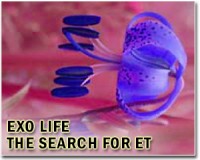 |
Tempe AZ (SPX) Mar 03, 2011 An important discovery has been made with respect to the possible inventory of molecules available to the early Earth. Scientists led by Sandra Pizzarello, a research professor at Arizona State University, found large amounts of ammonia in a primitive Antarctic asteroid. This high concentration of ammonia could account for a sustained source of reduced nitrogen essential to the chemistry of life. The work is being published in this week's Proceedings of the National Academy of Sciences (PNAS). The paper is titled, "Abundant ammonia in primitive asteroids and the case for a possible exobiology," and is co-authored by Pizzarello, geologist Lynda Williams, chemists Gregory Holland and Jeffery Yarger, all from ASU and Jennifer Lehman of UC Santa Cruz. The finding of a high concentration of nitrogen-bearing molecules in an asteroidal environment shown by the new study is very provocative. Besides the noble gases, nitrogen is the fourth most abundant element in the Sun and the universe overall. On the Earth, it is an indispensable ingredient of the biosphere, being essential to DNA, RNA and proteins. In other words, it is necessary for life's information transfer and catalytic processes. "All origins-of-life theories need to account for a sustained source of reduced nitrogen in order to make amino acids and nucleobases," said Pizzarello, who works in ASU's Department of Chemistry and Biochemistry in the College of Liberal Arts and Sciences. On the early Earth, on the other hand, the prebiotic inventory of reduced nitrogen necessary for the formation of N-containing biomolecules has been difficult to predict. The hypotheses of a reducing atmosphere had initially allowed one to envision considerable ammonia abundance as well as evolutionary pathways for the production of amino acids. However, the current geochemical evidence of a neutral early Earth atmosphere, combined with the known photochemical destruction of ammonia, has left prebiotic scenarios struggling to account for a constant provision of ammonia. An abundant exogenous delivery of ammonia, therefore, might have been significant in aiding early Earth's molecular evolution, as we should expect it to have participated in numerous abiotic as well as prebiotic reactions. It also is interesting to note that the new PNAS work was made possible by the finding in Antarctica of these exceptionally pristine, ammonia-containing, asteroidal meteorites. Antarctic ices are good "curators" of meteorites. After a meteorite falls - and meteorites have been falling throughout the history of Earth - it is quickly covered by snow and buried in the ice. Because these ices are in constant motion, when they come to a mountain, they will flow over the hill and bring meteorites to the surface.
Share This Article With Planet Earth
Related Links Arizona State University Life Beyond Earth Lands Beyond Beyond - extra solar planets - news and science
 U.K. scientists to search for alien life
U.K. scientists to search for alien lifeLondon (UPI) Feb 28, 2011 British scientists say they will lead a $650 million program searching for chemical signs of life on planets orbiting distant stars. Researchers at University College London are at the head of the Exoplanet Characterization Observatory mission, backed by the European Space Agency, that will use a new space telescope to look for biomarkers in the atmospheres of exoplanets, The Independen ... read more |
|
| The content herein, unless otherwise known to be public domain, are Copyright 1995-2010 - SpaceDaily. AFP and UPI Wire Stories are copyright Agence France-Presse and United Press International. ESA Portal Reports are copyright European Space Agency. All NASA sourced material is public domain. Additional copyrights may apply in whole or part to other bona fide parties. Advertising does not imply endorsement,agreement or approval of any opinions, statements or information provided by SpaceDaily on any Web page published or hosted by SpaceDaily. Privacy Statement |